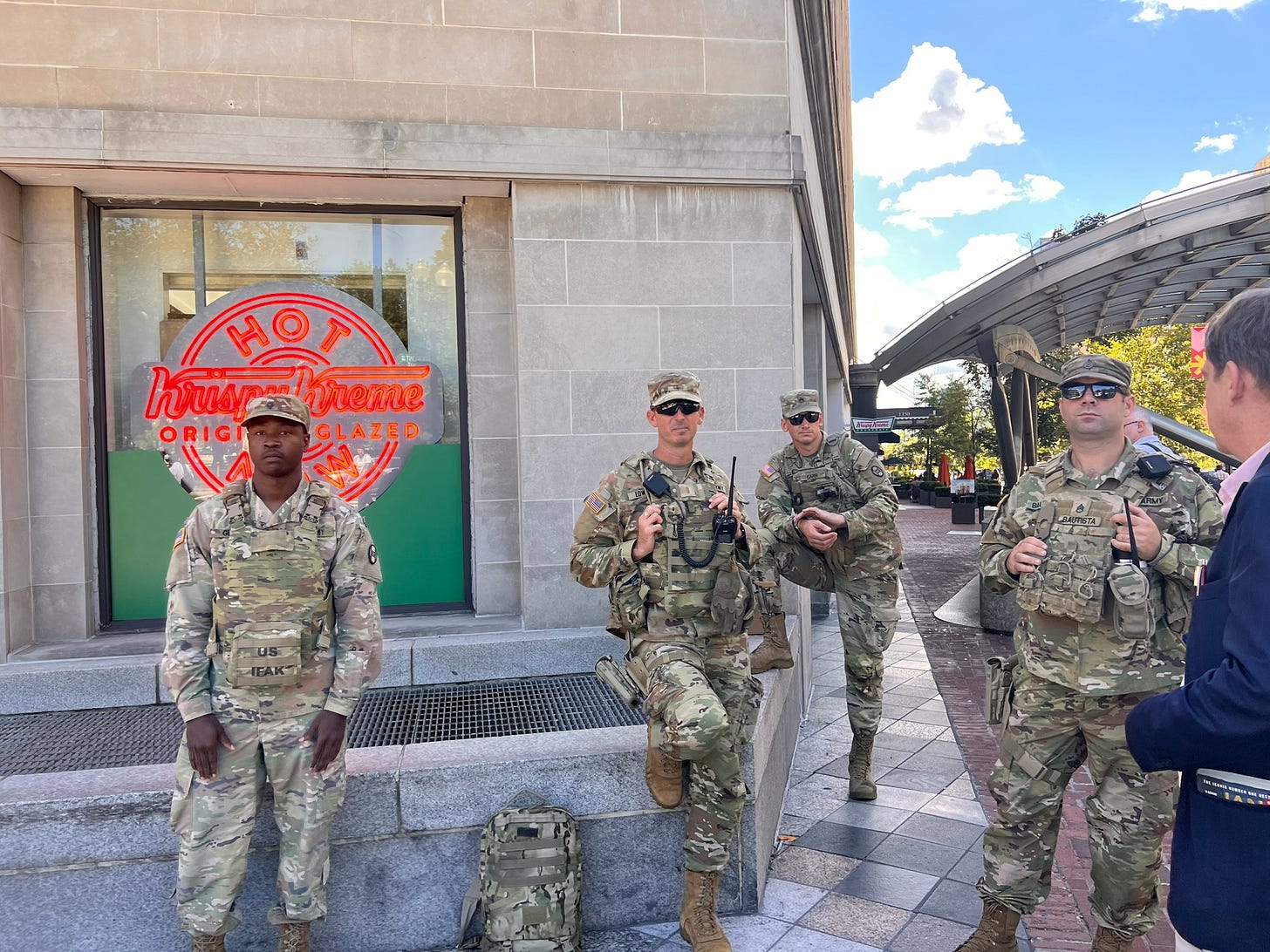The Krispy Kreme Brigade
The National Guard protects the donuts
Good Morning:
Yesterday on #DogShirtTV, the estimable Holly Berkley Fletcher executed a lightning coup and took over the introduction because she had some thoughts to share on the death of James Dobson. Then the estimable Minna Ålander showed up to talk about pink missiles in Ukraine and amethyst mines in Lapland:
The Situation
In my The Situation column yesterday, I took a strong stand in favor of placing National Guard troops outside of Krispy Kremes:
I want to express my support for the president’s crackdown on crime in my hometown of Washington, D.C.
I was skeptical at first. But then I stepped out of the Dupont Circle Metro station this morning, and everything changed. I realized I had been wrong. Oh so very wrong.
The Dupont Circle Krispy Kreme has always been a hotbed of crime. When I emerged from the Metro station and saw the National Guard on the scene, I suddenly saw the wisdom of the federal takeover of D.C. law enforcement.
Finally. The president is doing something about Dupont Circle donut crimes.
For far too long, daytime donut crime has plagued my city. It takes place so flagrantly and so out in the open that many people hardly even notice it anymore. They think it harmless, and it is, in its own way. But that’s the thing: A society that ignores harmless donut crime today will tomorrow turn a blind eye to churros. And then the next day it’s candy. These things are a slippery slope, and you have to draw a line somewhere. I believe in drawing lines. It’s kind of like broken windows policing—only with donuts.
The president has drawn a line.
Yesterday On Lawfare
Compiled by the estimable Mary Ford
Rebutting the Case for Israel’s June 2025 Strikes as Lawful Self-Defense
Faisal Kutty responds to Jeffrey Lovitky’s recent Lawfare article where he argued that Israel’s “Operation Rising Lion” was a lawful exercise of its right to self-defense. Kutty contends that Lovitky’s defense of Israeli military action against Iran hinged on an elastic interpretation of Article 51 of the United Nations Charter, emphasizing that stretching Article 51 to rationalize long pauses between strikes blurs the line between lawful and unlawful conduct.
This argument, while carefully constructed, rests on an elastic reading of Article 51 that risks undermining the core prohibition on the use of force in Article 2(4) of the charter. The legal framework for self-defense is deliberately narrow, not a renewable license for force. Stretching it to accommodate months-long pauses between attacks and responses—absent evidence of ongoing or imminent hostilities—blurs the line between lawful self-defense and unlawful preventive war.
Article 51 is framed as an exception to the general prohibition on the use of force. It allows a state to act in self-defense “if an armed attack occurs” and only until the Security Council has taken measures to maintain international peace and security. The text is unambiguous in its temporal orientation: It contemplates responses to an occurring or imminent armed attack, not indefinite retaliation for past harm.
Financial Institutions as Military Targets: A Legal Framework
Cory Pihl—in response to Israeli strikes on the Hezbollah-linked bank Al-Qard Al-Hassan—examines the legal, humanitarian, and threshold conditions that render institutions that help facilitate the financing of terrorist organizations legitimate military targets.
These strikes create precedent for when financial institutions facilitating terrorist financing might be considered legitimate military targets. The AQAH case suggests that when sanctions and regulatory measures prove inadequate in stemming financial support for terrorist operations, military action may become a legally justified option. As modern conflicts increasingly involve non-state actors using civilian financial networks to sustain military capabilities, clearer international standards are needed to determine when economic targets supporting hostile operations constitute legitimate military objectives, balancing security imperatives with civilian protection.
Podcasts
On Lawfare Daily, Mykhailo Soldatenko sits down with Michael O’Hanlon and Andriy Zagorodnyuk to discuss ways of defending Ukraine from present and future Russian attacks in the absence of North Atlantic Treaty Organization membership.
On Scaling Laws, MacKenzie Price and Rebecca Winthrop join Kevin Frazier to take stock of how artificial intelligence is being integrated into classrooms in the United States and abroad.
Documents
Mary Ford shares the text of President Trump’s recent executive order expanding the Department of Defense’s role in domestic law enforcement.
Today’s #BeastOfTheDay is the red panda, seen here being oh so very sleepy:
In honor of today’s Beast, hit snooze on your alarm one more time.
Keep reading with a 7-day free trial
Subscribe to Dog Shirt Daily to keep reading this post and get 7 days of free access to the full post archives.





